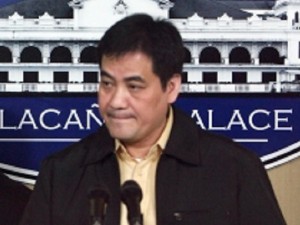Palace: Increased US presence not because of China
Malacañang on Thursday denied the disputes with other countries over territories in the West Philippine Sea (South China Sea) were the reason for the increased US presence in the Philippines that was announced by President Benigno Aquino III on Wednesday.
Secretary Edwin Lacierda, Mr. Aquino’s spokesperson, nevertheless acknowledged that the rise in the numbers of US troops and vessels visiting the country would contribute to the stability of the region, as well as improve the Philippine military’s capability to protect the country.
Military ‘updates’
Lacierda said the beefed-up US presence was not related to the territorial disputes with China and other claimant-countries to the Spratlys and other potentially rich islands in the West Philippine Sea.
“No, it’s in line with the belief of the President [that] we have to update our military training and capability,” he said during the daily Malacañang news briefing.
“As you know, our military hardware are not quite up to date with [that of] our neighbors. So it’s imperative for us to update our military hardware and that’s for purposes of the protection of our country as well. But this is primarily to improve our military training and capability,” he said.
As for whether an increased US presence would contribute to stability in the West Philippine Sea, Lacierda said: “It will certainly.
He reiterated, however, that the primary reason for expanding the joint military exercises with the United States was the expected improvement in the capability of the Philippine military.
“What we can say for certain is that the acquisition of military hardware and the training of our Philippine troops would certainly improve our capability to protect our borders and to protect ourselves from any threat from without,” he said.
“So that is our position. That’s the reason we’re getting training, not only from them (US), by the way,” he added.
Defense Secretary Voltaire Gazmin on Thursday described plans to hold more joint military training exercises with the United States as an “expanded VFA (Visiting Forces Agreement), but definitely with no bases” involved.
He said the “high value” and “high impact” exercises would benefit the armed forces of both the Philippines and the US—which would be sending over more troops—although he could not say how many servicemen would be participating on both sides.
“I cannot be definite on the numbers but definitely there will be more participation of forces from both the US and the Philippines,” Gazmin told reporters during the 115th anniversary celebration of the Philippine Army at Fort Bonifacio.
New exercises
He said the exercises would be different from those conducted in Mindanao, which American forces traditionally visit as part of the annual Balikatan joint training exercise.
“We are looking at exercises that will be of value to both countries, those high-impact exercises that can help us in a lot of areas,” said Gazmin.
He cited among these exercises at sea to help the Philippine Navy improve its emergency and disaster response skills.
President Aquino earlier said the Philippines was looking to the United States for help in building up its defense capability in the midst of maritime tensions with China in the West Philippine Sea and other security concerns.
Originally posted at 08:54 pm | Thursday, March 22, 2012
